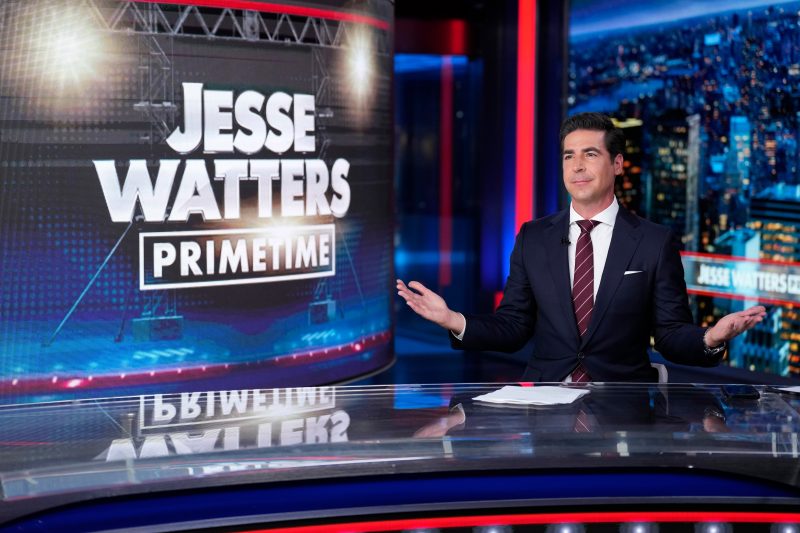There is admittedly no reason to take Jesse Watters’s rhetoric seriously. An impartial observer could safely assume that the Fox News host was elevated to hosting a prime-time show on the channel not by virtue of his well-articulated explanations of complex policy issues but because of his preternatural ability to say obnoxious things with a chuckle. He is the clever, good-looking, right-wing grandson that so many Fox News viewers wish they had.
But he still commands an audience. The things that he says, however detached from reality, still reach millions of people and are understood by those millions as accurate or compelling. So when he tries to wave away Donald Trump’s indictment for attempting to retain power after the 2020 election despite his loss, it’s worth explaining why Watters is so obviously wrong.
During his program Monday, Watters made his case, centered on the effort by Trump and his allies to send slates of unauthorized electoral college voters to Washington before Jan. 6, 2021.
“If Al Gore had asked Florida to send an alternate slate of electors after the 500-vote recount margin, Al Gore would have been charged with conspiracy to defraud the government?” Watters said with disdain. “Al Gore believes he won that election. His opponent’s brother was the governor of Florida in an election this close. You’re saying Al Gore working the phones before certification was illegal? It’s preposterous.
“There were alternate electors sent in 1876. There were alternate ones sent in 1960,” he continued. “On advice of counsel, Trump asked [Vice President Mike] Pence to kick it back to the states for recertification where state legislatures are constitutionally empowered to determine elections. That’s called politics.”
That the state of Hawaii sent competing slates of electors in 1960 has been elevated by Trump defenders repeatedly since the 2020 election. It’s useful to start there because the circumstances were informative. John F. Kennedy and Vice President Richard M. Nixon were nearly tied in the state, with initial counts favoring Kennedy and a recount aiding Nixon. By Dec. 14, the date on which electors must be selected, Nixon had the lead — but the legal challenges were ongoing. Kennedy might still prevail. So both campaigns sent elector slates to D.C. and, when a final count gave the edge to Kennedy, Nixon himself approved the Kennedy slate instead of his own on Jan. 6, 1961.
The 2000 election, you may recall, came down to the results in Florida. They were, in fact, very close. Gore and his opponent, Texas Gov. George W. Bush, pushed to shape the recount of votes cast in the state for weeks after the election. Ultimately, the Gore campaign’s effort to continue counting votes was blocked by the Supreme Court.
Importantly, Gore didn’t introduce an alternate slate of electors. That’s because the Supreme Court’s decision preceded the Dec. 14 date and, on Dec. 13, Gore conceded. The issue was finalized before Dec. 14, so there was no lingering question floating into the period from Dec. 14 to Jan. 6. There was no viable path to victory for Gore once the Supreme Court weighed in, so there was no need to have an alternate slate of electors ready to go as there had been in 1960.
The final margin in Hawaii in 1960 was 115 votes, although the results of that contest wouldn’t have been determinative in the electoral college. In Florida in 2000, the margin was 537 votes, votes that decided the presidency.
Now, let’s consider Trump’s actions three years ago. In 2020, the closest state was Arizona. The margin there was 10,457 votes — more than 19 times the margin in Florida in 2000. By Dec. 14, there was no viable path to victory for Trump, but his campaign submitted an alternate slate of electors anyway.
They also did so in a number of other states including, most ludicrously, Michigan, which Trump lost by 154,181 votes. That’s 287 times the number of votes by which Bush prevailed in Florida. It’s 56 times the margin by which Trump lost New Hampshire in 2016, that year’s closest margin but one Trump wasn’t worried about since he’d already locked up the electoral college victory.
Not only was there no path to victory for Trump in the closest states in 2020, there was no credible question at all about the results in any of those. The states certified the outcomes and submitted electors, but the Trump campaign tried to create alternate electors anyway — to keep alive the idea of having Pence reject the validly submitted electors from the “contested” states.
“That’s called politics,” Watters suggests, which is true only in the sense that it involves political considerations. It’s like saying that corking a bat or throwing spitballs is “baseball” — it is, but it’s also a violation of the spirit of the competition, as well as the rules. It’s not how the game is intended to be played.
Trump had no credible path to the presidency. He was hoping that his vice president or Republican legislators would simply cheat on his behalf. Whether that constitutes a crime for which Trump will be convicted by a jury remains to be seen. But it is not comparable to what Kennedy did in 1960, and it is certainly not comparable to what Gore didn’t do in 2000.
Not that Watters cares. He’s Fox News’s clever grandson, the rascal who always has a little scheme that he’s working. In this case, it happens to be defending Trump’s efforts to undermine democracy.








